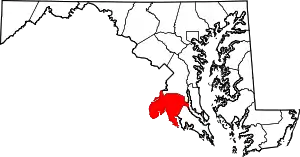Ironsides, Maryland
Ironsides is an unincorporated community or "post village"[1] in Charles County, Maryland, United States with zip code 20643.[2] The Post Office was established in 1897[3] and remained open until at least 1976.[4] Today Ironsides area residents have Indian Head or Nanjemoy addresses. The nearby historic post offices of Nanjemoy and Doncaster, dating from 1800 and 1855, are often associated with historical records of Ironsides.
Ironsides, Maryland | |
|---|---|
 Ironsides Location within the state of Maryland  Ironsides Ironsides (the United States) | |
| Coordinates: 38°29′30″N 77°9′35″W | |
| Country | United States |
| State | Maryland |
| County | Charles |
| Elevation | 126 ft (38 m) |
| Time zone | UTC-5 (Eastern (EST)) |
| • Summer (DST) | UTC-4 (EDT) |
| GNIS feature ID | 588681 |
Geography
The community lies at an elevation of 126 feet (38 m).[5]
Etymology
The origin of the name of the town is unclear; it is either a reference to the Frigate USS Constitution, known as "Old Ironsides", or to iron siding on a house renovated there in 1886.[6]
History
Nearby, Old Durham Church (est. 1692) is a local landmark; originally a log structure, it was replaced with brick in 1732 and renovated in 1791. Revolutionary War General William Smallwood and colonial Governor William Stone are buried there.[4][7] Smallwood was elected vestryman at Old Durham Church in 1788, and built a road from his home at Mattawoman Plantation in modern Rison, to the church. "Smallwood Church Road" today is a paved two-lane road running from Rison to Ironsides.[4][8] During the colonial period, the Ironsides area was divided up into small farms with colorful names: Ward's Delight, Ward's Addition, Wards Trouble, Ingerthorpe/ Ingerstone/ Angerstone/ Ingolthorpe (variously spelt), Charlestowne, Ragged Chance, Randolphs Addition, Senas Delight, Dembar Addition, the Land Resurveyed, Franklins Beginning, Expectation, and Moles Adventure.[9]
The most prominent public buildings in Ironsides today are the tiny Ironsides Store, the Ironsides Volunteer Rescue Squad Company 58,[10] and the historical Church of the Lord Jesus Christ. In 1966, the Ironsides Rescue Squad Inc. was declared by the State of Maryland to be in forfeiture for payment of taxes or filing an annual report.[11] The town is at the crossroads of state routes 6 (Port Tobacco Road) and 425. Route 425 is called Ironsides Road south of Ironsides, and Mason Springs Road to the north. This latter section of road, running to Pisgah, was known as the "Johnnie Cake Road" in 1918.[12] The concrete arch bridge on Route 6 over nearby Wards Run was built in 1929 and rehabilitated in 1987.[13] The town is along Maryland Scenic Byways Number 16, the Religious Freedom Byway, on the way to Durham Church. The Charles County Genealogical Society Cemetery Transcription Project has inventoried the Gray family cemetery at Mansion Hall in Ironsides, which is a ruin dating from 1700 at a site called "The Mistake",[14] which consisted of 227 acres (0.92 km2) in 1732.[15]
In 1914, a wealthy retired stockbroker, Thomas W. Poole, made the news when he committed suicide at his estate in Ironsides.[16]
In 1948, Maryland became the twentv-first state to join the "American Tree Farm" movement, with the dedication of a 1,278-acre tract of forest owned by the Glatfelter Pulpwood Company, still a major landholder in the Ironsides area.[17]
In 1953, a 27-year-old volcanologist who grew up in Ironsides, Dr. Rolf Werner Juhle, vanished in the "Valley of 10,000 Smokes", Katmai National Monument, Alaska. His body was never found. Dr. Juhle's family owned a tobacco and cattle farm in Ironsides.[18][19]
References
- Annual Report of the Bureau of Statistics and Information of Maryland, Maryland Bureau of Statistics and Information, 1907.
- U.S. Geological Survey Geographic Names Information System: Ironsides, Maryland
- The Postal History of Maryland, Delmarva and D.C., Smith, C. M., and Kay, J. L., 1984 as cited in Pathways to History: Charles County Maryland, 1658–2008; King, J., Arnold-Lourie, C., and Shaffer, S., Smallwood Foundation Inc., 2008
- "Charles County Maryland", Charles County Bicentennial Committee, 1976.
- Maryland Geological Survey, Volume 10, The Johns Hopkins Press, Baltimore, 1918.
- The placenames of Maryland, their origin and meaning, Kenny, H., Maryland Historical Society, 1988.
- Maryland: A Guide to the Old Line State, Oxford University Press, NY, 1948.
- History of Durham Parish Charles County Maryland 1692–1892, Painter, W.P., Rev., 1894
- 1753 Charles Co. Rent Roll list; Charles County Land Records, 1786–1790 Book D#4; Maryland Genealogical Society Bulletin Vol 1–38, Vol 34, No. 3 Summer 1993, Charles County Depositions.
- http://www.ironsidesrescue.com
- "Governor's Proclamation Giving Notice of Forfeiture of Charter of Delinquent Corporations", Cumberland Evening Times, November 29, 1966
- Archives of Maryland, Session Laws, 1918 Session, Volume 486, page 343.
- Historic Bridges of the United States http://bridgehunter.com/md/charles/100000080013010/
- Charles County Historic Preservation Plan, July 2004. at http://www.govt.co.charles.md.us/pgm/planning/plans/historical/plan/hp_plan.pdf
- Early Families of Southern Maryland Volume 10, Jourdan, E. G., Heritage Books, 2007. p. 157.
- New York Times, April 14, 1914. "T.W. Poole a Suicide. Retired Broker Dies on Estate in Drug-Filled Room."
- Paper Trade Journal, Vol. 127, Vance Publishing Co., 1948, p. 64
- "Parents of Lost Scientist Plan to Visit Alaska Soon"; Fairbanks News-Miner, December 29, 1953.
- "The Geological Studies of Rolf Werner Juhle (1929–1953)", Journal of Geological Education, Vol. 2 No. 2, Fall 1954, pp. 47–51.
